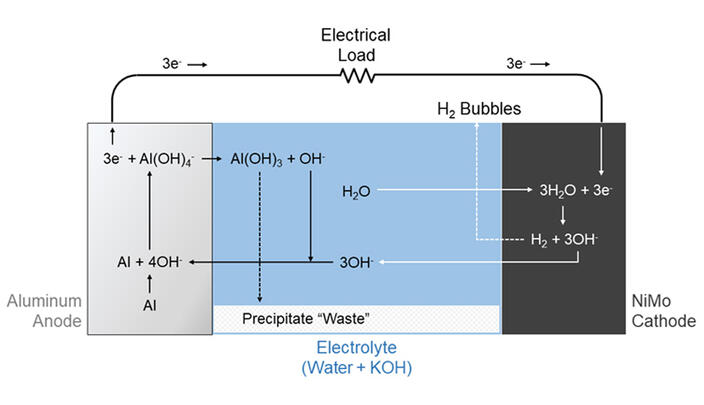Al-H₂O Aluminum-Water Energy Module
L3Harris has developed a novel aluminum-water (Al-H₂O) energy technology for undersea power generation. Invented and patented by our founders at MIT, the electrochemical system provides safe, scalable, and nontoxic energy storage with extremely high energy density, promising a 2-10x improvement in the endurance of unmanned underwater vehicles (UUVs) and sensors, navigation, power, or communications nodes operating on the sea-bottom or the water column. These systems are ideal to empowering maritime unmanned systems with the endurance and power to execute "dirty, dull, and dangerous" missions, such as mine-sweeping or pipeline survey, thus protecting human lives and minimizing on-station, maintenance, and labor costs associated with operating ships, aircraft, or other expensive assets.
The graphic depicts the system-level energy densities of L3Harris' Al-H₂O vs. various energy storage technologies for maritime use. The graphic contemplates the two common design scenarios in subsea system design: where neutral buoyancy is required (e.g., in UUVs), and where it is not (e.g., ocean-floor sensors and systems). The system-level energy density of L3Harris’ neutrally buoyant systems is aided by their ability to use the hydrogen byproduct of our cells as a buoyancy compensation medium."
Energy modules are cost-competitive with alternative energy module chemistries with similar energy densities and leverage a simple design with few moving parts that is scalable and modular to meet the mission requirements and form factors of many customers with minimal customization.

Harnesses the Significant Electrochemical Energy Stored in Aluminum
While a variety of technical hurdles have traditionally made this energy difficult to access, our proprietary and patent-pending technology overcomes these issues. In addition to improved energy densities, the aluminum-water chemistry is inherently safer and more stable than many other energy module and fuel cell chemistries typically found in maritime use.

Chemistry
As shown in the cell diagram, Al-H₂O modules consist of three main components: an activated aluminum anode; an aqueous alkaline electrolyte; and a hydrogen-evolving cathode. Note the injection of water as an oxidizer into the system, and the removal of the nontoxic aluminum hydroxide and hydrogen gas byproducts. This mass transfer can be done continuously or intermittently.

Our Technology
L3Harris' technology harnesses the significant electrochemical energy stored in aluminum metal. Prior to activation our systems are chemically inert, with no risk of explosion and a virtually unlimited shelf life, including in stasis (dormant) conditions on the seabottom. Once our systems are activated with water, their safety profile is similar to that of household alkaline energy modules, and they can easily be transported, even via commercial airlines.

Comprehensive Testing
The Naval Surface Warfare Center, Carderock Division recently conducted preliminary safety testing of some of our cells and found them to be inert over a range of abusive conditions that would typically cause lithium-ion and even silver-zinc energy modules to fail dangerously.

Variants of Al-H2O Energy Modules
Al-H2O systems are modular and scalable and come in two primary variants that can be customized for customers’ specific missions or form factors. The two primary variants are: 1) neutrally buoyant Dynamic modules for UUVs, USVs, ROVs, or submersibles; and 2) negatively buoyant Static modules for buoys and small expendables floating or suspended in the water column, or fixed or expeditionary installations providing >1 MWh of energy on the seabottom.



